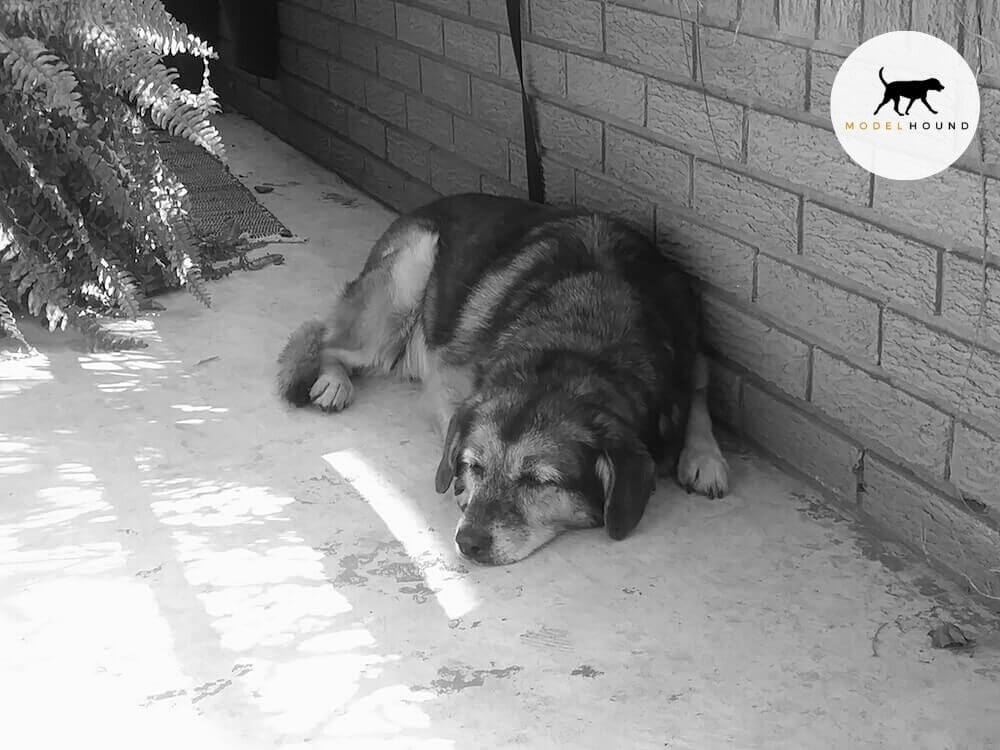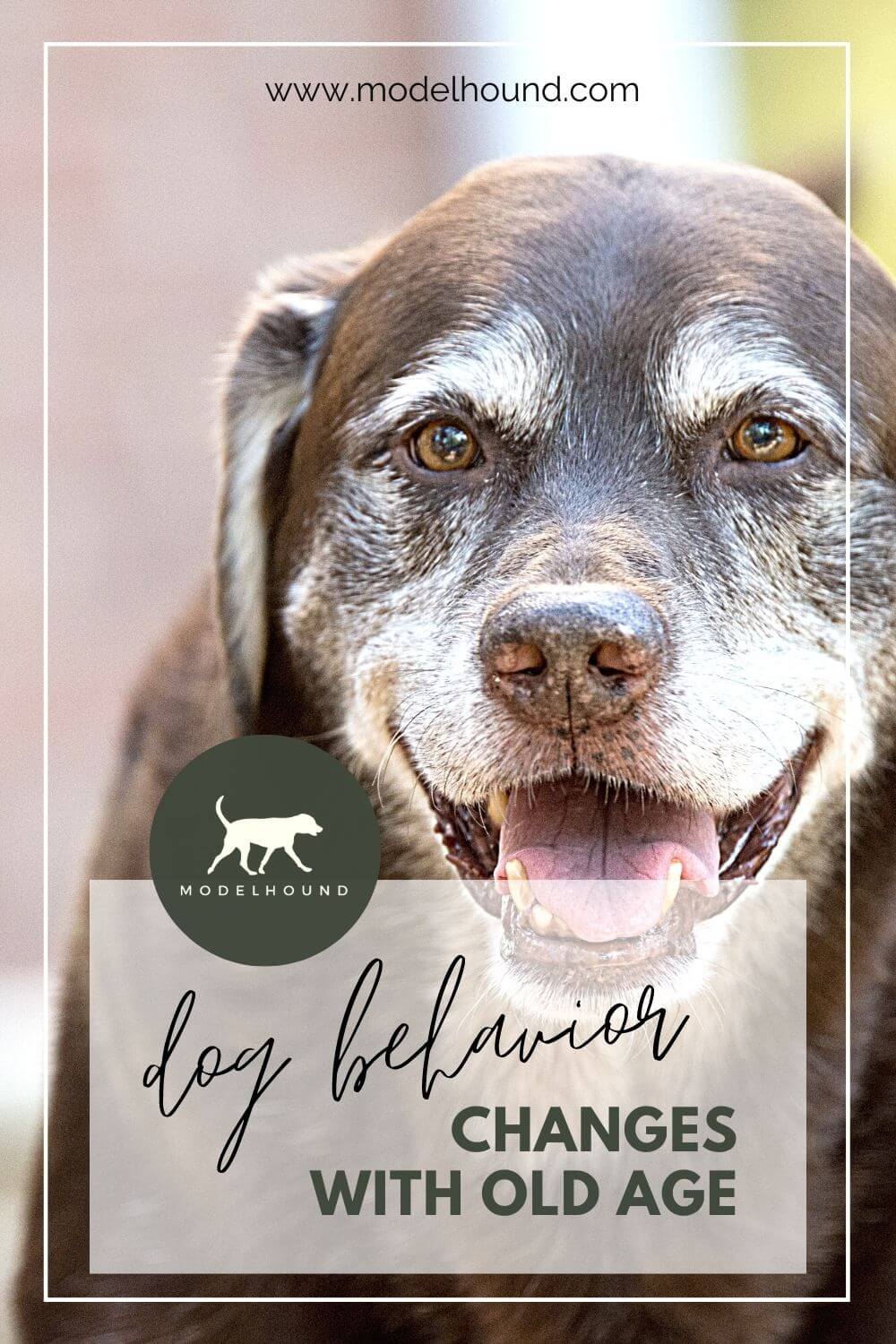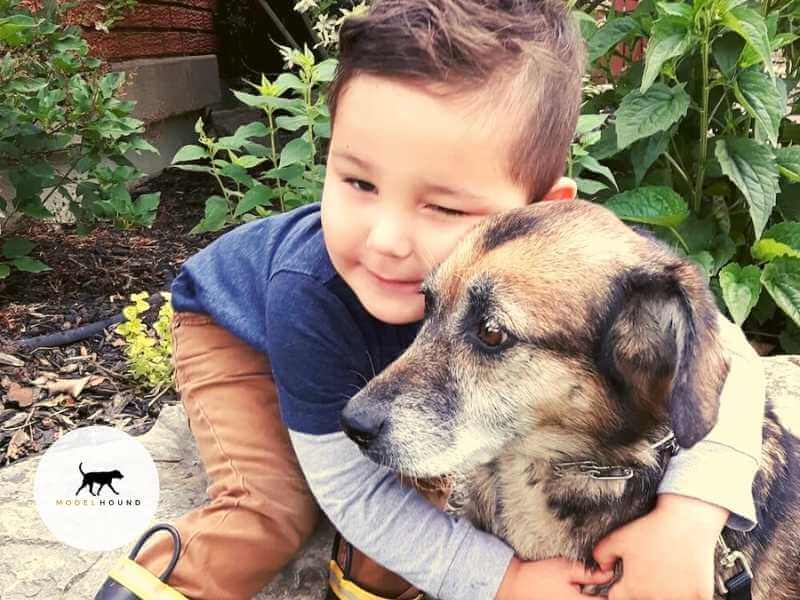Dog Behavior Changes With Age:
Managing the Golden Years
If you have a senior dog, you'll know that dog behavior changes with age. Our dog's old age sort of sneaks up us, though, ever so slowly.
The years whip by, until one day you realize that your sidekick doesn't seem all that interested in chasing sticks and going for long hikes anymore. She grunts a little when she lies down, and is a bit slower in getting up again.
Stairs become more difficult to manage. Noisy kids, while once fun for your pup, are now tiring and slightly annoying.
Normal Dog Behavior Changes with Age
"Senior" age for a dog begins around 7 years old, a bit earlier for large breeds. That's the sad thing about being a dog owner - their lives are so short and the decline of old age happens in a relatively quick time frame.
It's been several years since my sweet old dog, Justice, died at 13 years old. She was such a patient, gentle girl, right up to her last day. But those last couple years of her life were hard on both of us. I want to try to help make it a little easier for you.
The senior years of your dog's life can feel scary, for both of you. A lot of that comes from the unknown - are these changes that you're noticing in your older dog normal? What can I expect? What should I be worried about?
Drawing from my experience as a trainer, as well as having been through this with my own dog, Justice, let me show you what to expect with dog behavior changes with age and how best to help your senior dog.
Regression in House-training
In a younger normally-house-trained dog, any regression in house-training would typically make me think that something medical was at the root of the problem, such as a urinary tract infection.
And while that could be the case for your senior dog - in fact, I would still start with a visit to the vet to double check as UTI's can be quite common in old age - it could also simply be old age.
Either your dog isn't quick enough anymore to make it outside due to arthritis pain or there is cognitive decline causing her to forget that she's not supposed to pee or poop in the house... both are very common dog behavior changes with age.
New Anxiety or Fears
As our dogs age, their eyesight and hearing begin to fail. Combined with possible cognitive decline, that can make their world feel scary and different!
This in turn often causes new anxiety or fears to surface, which displays as increased barking and whining, timidness around things or environments that never used to bother your dog, or clinginess to you. It may simply be caused by vision and hearing loss, or it may be combined with CCD (see below).
Canine Cognitive Dysfunction (CCD)
Perhaps you've noticed your senior dog standing awkwardly in the corner or seeming lost in a familiar place. Canine cognitive dysfunction, or CCD, is a common condition that affects our aging dogs.
Statistics are that 1 in 3 dogs over the age of 11 experience CCD, and by the age of 16, almost all dogs will display at least one sign.
Here's what to look out for:
- Disorientation/confusion - forgetting where things are in the house, pacing, walking in circles
- Forgetting previously learned commands, tricks, and rules of the house
- Changes in awareness or responses to stimuli
- Irritability
- House-training regression or incontinence
- Not much desire to play
- Excessive barking or vocalizing
- Loss of appetite
- Sleeping in the day, but being awake at night
Not much can be done to treat CCD, unfortunately, as it's a brain deterioration disease similar to Alzheimer's in humans. As always, do take your dog to get checked by the vet though.
That being said, small changes around the home and in your lifestyle can help in the short-term with dog behavior changes with age (see below for tips on how to help your aging dog).
New Behaviors Around Interactions
What might look like aggression in an old dog is often simply a defense mechanism. Senior dogs can't hear or see very well anymore, and are easily surprised by an unexpected person petting them that they didn't see or hear coming, or perhaps it's painful to be petted because of arthritis.
It's also common to see older dogs become more clingy or attention seeking, even at night when you are trying to sleep! Or the opposite can be true, too, with your dog wanting more space and time alone.
Changes in Activity
Just like us, our dogs slow down as they age. Even a previously active dog won't be as interested in long walks or boisterous games of fetch!
Sore joints is largely to blame for this, and you'll notice that it takes your dog a little extra time to get up from her bed or the floor. Going up and down stairs becomes more challenging, as does getting in and out of the car.
How to Help Navigate Dog Behavior Changes With Age
Making changes to your home and lifestyle can go a long way to keep your dog comfortable and minimizing the impact of these dog behavior changes with age.
To Help With Deafness
- Start training with hand signals long before deafness becomes an issue.
- Get your dog's attention using vibrations - knock on something, clap your hands, stomp your foot a little on the floor.
- If you know that your dog's hearing is going (or gone!), be careful of letting her off-leash outside. I can tell you from experience that if you don't have a way of communicating with your dog, such as a long line or vibrating collar that she's been trained to respond to, the risk of her getting lost is high. As soon as she's out of sight, you have no way of calling her back if she can't hear you!
- Don't approach a deaf dog from behind or you'll startle her. Instead, approach from the side or in front if you can. Make sure kids know this as well!
To Help With Vision Loss
- Keep clutter off the floor.
- Don't move furniture or your dog's food and water dishes around.
- Put baby gates in front of stairs to prevent falls.
- Block off dangerous areas such as pools, and make sure to have a secure fenced in area outside.
For Anxiety and General Fear
- Take shorter, more frequent walks.
- Continue to give mental stimulation through games and play.
- Stick to a regular routine.
- Allow your senior dog extra space away from noise and stimulus like rowdy kids, strangers and new dogs. Now is not the time to work on socialization.
For Arthritis and Joint Pain
- Start joint support supplements early, even when your dog is only a couple years old. My dog, Milo, has been on a supplement since he was a year old as he started showing joint problems already at that time. Green-lipped sea mussels are amazing, but there are many different options.
- Get an orthopedic dog bed.
- Use a raised feeder for food and water bowls to make it easier for your dog to eat and drink.
- If necessary, use ramps for getting your dog in and out of vehicles or up and down stairs in the house.
- Try putting small non-slip rugs at the top and bottom of stairways that aren't carpeted, or consider installing a runner on the stairs for extra grip. We put rugs down for Justice, and it made a huge difference in her confidence in using the stairs without slipping or falling.
- Be
understanding! Don't call her to come when she's lying down if it's not
necessary... getting up is really hard for an arthritic dog to do!
- Watch her weight. A senior dog doesn't burn calories like her younger self might've, so it's easy to pack on the pounds. Unfortunately, this only makes it harder on her joints and increases any pain she's already in from arthritis.
For House-training Regression
- Give your senior dog more opportunities to go outside and relieve herself.
- The older she gets, the more likely that you may have to get up in the night to take your dog out as well. Set an alarm clock if you need to, or place her bed beside yours so that you can hear right away if she needs to go out.
- Don't scold, yell, or hit for soiling in the house! An old dog can't help it, and that will only make her more anxious.
- Plan for times that you need to be away during the day for longer periods. Have someone come by to take your dog outside a couple times, or leave them with a friend.
When to Get Help
Paying attention to your dog's needs will go a long way to helping them age comfortably.
If you notice your older dog acting newly anxious, aggressive or showing cognitive failure, start by visiting your vet to rule out any medical issues that may be causing these dog behavior changes with age.
Sadly, there comes a time when you have to make the decision to let your old friend go. Sometimes the decision is simple, where an emergency happens that requires immediate veterinary intervention. Often, though, it's difficult to know as an owner when is the right time.
I'm not a vet, so it goes without saying that your vet can give you the best advice on how much pain your dog is in, and if what you're noticing are dog behavior changes with age. You know your dog, but it is easy to want to hold on for too long...
Trust your vet's advice, as they are looking at it from a clinical, less emotional viewpoint. Sometimes that's exactly what you need - an outside, clear-headed opinion that has your pet's best interests in mind. It's what we want, too, but it's harder to see that when we're so emotionally involved!
My Experience with Justice
 Our girl, Justice, at 13 years old.
Our girl, Justice, at 13 years old.For us with Justice, I knew it was coming. She was 13 years old, and the last year or so she had significantly declined. She was still happy, and with medication, her joint pain was mostly under control.
We
didn't go for walks anymore, as that was too much for her, but she did
enjoy lazing in the sunshine in front of the house where she could see
everyone who was walking by. As a hound, she sometimes followed her nose
away from home a couple houses away, and then didn't hear us when we'd
call her back.
But near the end, Justice was stumbling a lot, even when the ground or floor was level. She would miss a step and fall on her face, and trip on the stairs. Her panting increased (both a sign of pain and/or cognitive dysfunction) and she had trouble sleeping.
I agonized over the decision of when to put her to sleep. Just
when we arrived at the conclusion that NOW was the time, she fell down
the stairs. The exact situation I had wanted to avoid, an emergency, left us no choice.
We rushed her over to
the vet so she could be relieved of her suffering. Let me tell you, it was a heartbreaking way to see my sweet girl go.
I regret
not having made that vet appointment a week earlier, but I think she'd
forgive me. I wanted to share my experience with you, though, so that if
you are in that hard place, maybe it can help you in your decision.
Yes, it's a lot of extra care as your dog ages, but is so worth it. Our dear dogs
need us, especially at the end, to help them live comfortably through
their golden years, navigate those dog behavior changes with age, and then to pass softly on.
- Home
- Behavior Challenges
- Senior Dog Behavior



